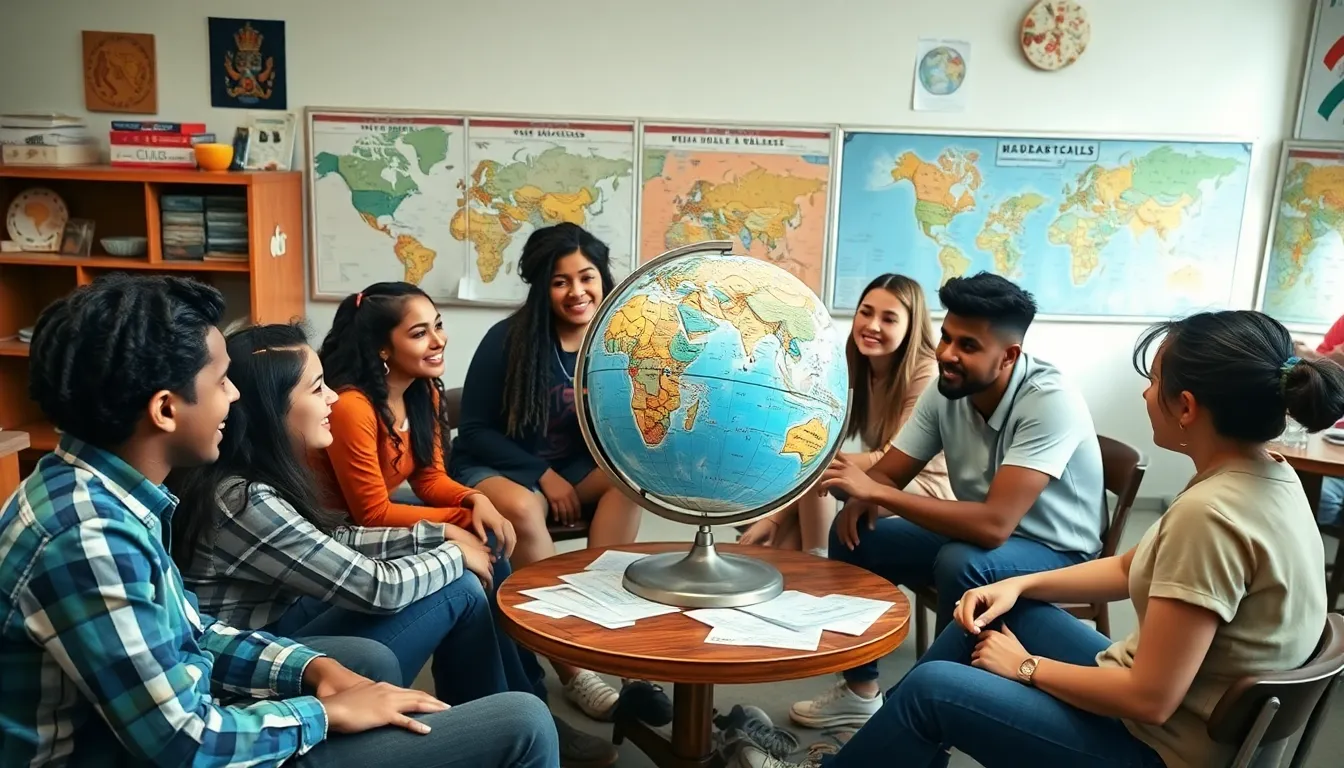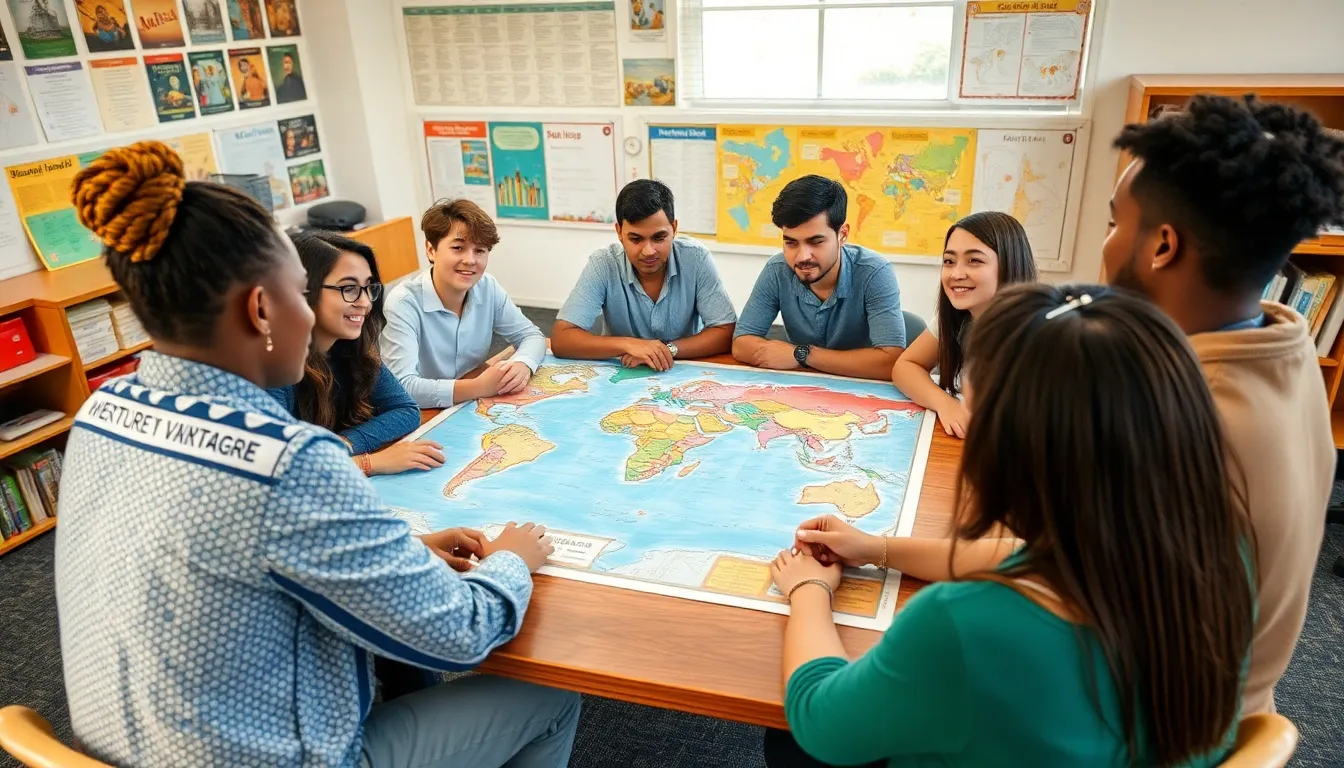In a world that feels smaller by the day, global studies offers a passport to understanding the complex tapestry of cultures, economies, and politics that shape our lives. Imagine diving into the mysteries of international relations while sipping coffee in your pajamas—now that’s a study session worth waking up for!
This field isn’t just for aspiring diplomats or world leaders; it’s for anyone curious about how global events impact their daily lives. From climate change to trade wars, global studies equips individuals with the knowledge to navigate today’s interconnected world. Buckle up as we explore why this discipline is not just relevant but essential for anyone wanting to make sense of the chaos around them.
Table of Contents
ToggleOverview of Global Studies
Global studies examines the interactions among cultures, economies, and political systems in a connected world. This field provides insights that are relevant to various disciplines.
Definition and Scope
Global studies encompasses multiple dimensions, including sociology, economics, history, and political science. It analyzes cross-border issues, such as migration patterns, international trade, and environmental challenges. The focus extends to understanding how local cultures adapt to global trends. Students and professionals explore global governance structures and their impacts. The multidisciplinary nature makes this field applicable to diverse career paths.
Importance in Today’s World
The significance of global studies lies in its relevance to contemporary challenges. Climate change impacts ecosystems worldwide, affecting food security and human health. International trade policies shape economic landscapes, influencing employment opportunities. By examining these dynamics, individuals become more informed citizens. Understanding global events enhances critical thinking and problem-solving skills. Professionals equipped with this knowledge contribute effectively to solving pressing global issues.
Key Areas of Focus in Global Studies


Global studies encompasses various important topics that highlight our interconnectedness. It promotes understanding of the complex realities we face today.
Cultural Studies
Cultural studies examines the nuances of identity and tradition worldwide. This area explores the interactions between local cultures and global influences. As a result, it reveals how globalization shapes societal norms. Individuals studying these dynamics gain valuable insights into cultural diversity. Students analyze media, art, and language as reflections of cultural exchange. Research in cultural studies also includes topics like migration patterns and community responses to global trends. Ultimately, this exploration builds empathy and fosters global awareness.
Economic Implications
Economic implications focus on the interconnectedness of global markets and trade. Students study the impact of economic policies on various populations. Trade agreements and tariffs play significant roles in shaping local economies. Investigating these relationships helps understand globalization’s effects on job creation and employment patterns. Recent data illustrates how economic crises in one region can have ripple effects worldwide. Analysis of global supply chains highlights vulnerabilities and dependencies within economic systems. Overall, this field equips individuals to navigate and address economic challenges.
Political Dynamics
Political dynamics examine the complex relationships among nations and international organizations. This area includes the study of diplomacy, conflict resolution, and governance. Understanding power imbalances allows individuals to critically assess global politics. The influence of NGOs and multinational corporations in political discourse is significant. By analyzing international policies, students can identify trends affecting peace and security. Case studies on political movements illustrate the grassroots efforts driving change. Ultimately, this exploration provides tools for engaging in informed civic discussions.
Methods and Approaches in Global Studies
Global studies employs diverse methods and approaches to analyze complex issues. These methods enhance understanding of varying cultural, social, and economic dynamics.
Qualitative Research
Qualitative research in global studies focuses on understanding human behaviors, beliefs, and experiences through interviews and case studies. Ethnographic methods often capture in-depth perspectives from individuals within their cultural contexts. This approach provides insights into how globalization affects people’s daily lives and shapes their identities. By analyzing narratives and personal experiences, researchers uncover the meanings individuals attach to global phenomena. Engaging with communities allows scholars to gather rich, detailed data that quantitative methods might overlook. Enhancing empathy and awareness about global issues benefits students and practitioners alike, fostering solutions that respect cultural differences.
Quantitative Research
Quantitative research addresses global studies by collecting and analyzing numerical data to identify trends and patterns. This approach utilizes surveys, statistical analysis, and numerical modeling to quantify relationships among variables. Large-scale datasets often reveal significant correlations between economic indicators and social outcomes. Researchers might examine how trade policies impact employment rates across regions. By employing rigorous statistical methods, researchers validate hypotheses and draw data-driven conclusions. Combining qualitative insights with quantitative findings provides a comprehensive understanding of global challenges. Understanding these statistical relationships aids in formulating effective policies and interventions for diverse societies.
Challenges and Criticisms of Global Studies
Global studies encounters significant challenges and criticisms that impact its effectiveness. It navigates complex ethical considerations alongside methodological limitations.
Ethical Considerations
Ethical issues arise in global studies, particularly regarding representation and bias. Research often involves marginalized communities, necessitating sensitivity in approach. Scholars must consider how their work affects these communities, ensuring that voices are not overshadowed. Transparency becomes crucial, as well; acknowledging funding sources and potential conflicts of interest fosters trust. Engaging local perspectives during research enhances ethical integrity. Researchers that involve participants in the study process also promote ethical research practices. In an increasingly interconnected world, respecting cultural contexts remains vital for ethical global studies.
Methodological Limitations
Methodological limitations pose challenges when analyzing global issues. Diverse approaches exist yet not all capture the complexity of global interactions. Qualitative methods, while providing depth, may lack generalizability. Quantitative research often fails to account for nuances within cultural contexts. Data availability and reliability can also hinder research quality, especially in less-developed regions. Varied definitions of global phenomena complicate comparisons across studies. Researchers strive to balance these limitations by utilizing mixed methods, combining both qualitative and quantitative data for a comprehensive view. Addressing these limitations strengthens the overall impact of global studies.


